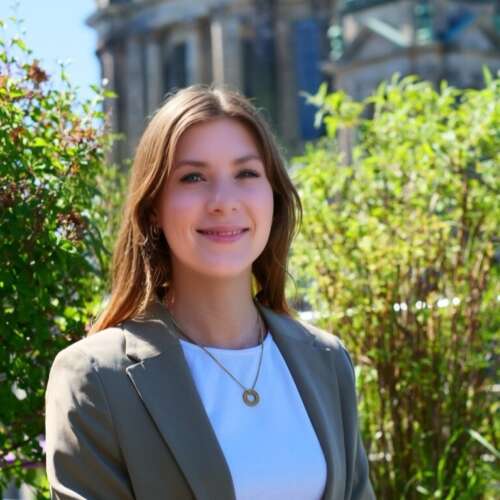With Privilege Comes Responsibility
Berlin – a city full of history, full of change, and full of responsibility. Benedikt Assies knows this all too well. Growing up in a family business, he is now actively involved in social and cultural projects. In our interview, he shares why social commitment is not a “nice-to-have” for him, but a fundamental duty.
Hi Benedikt. You are a new shareholder at PHINEO. Please introduce yourself.
Hi, I’m Benedikt Assies. I’m from Berlin and grew up in a family business. Today, I lead the New Business division in our family office, which includes everything outside our traditional core business.
What exactly do you do?
Our roots lie in outdoor advertising. However, we have since expanded significantly into venture capital. We also run our own venture studio and have a broad portfolio. We invest in various projects — not only for economic success but also in cultural and social initiatives. Furthermore, we support projects with a positive impact, especially in Berlin and the surrounding area.
Why is that important to you?
I believe in fostering new ideas that create positive change. That’s exactly what PHINEO does, which aligns perfectly with my own convictions. I met Andreas Rickert through various NextGen networks I am part of. We connected immediately and shared similar views. Later, he approached me and asked if I would be interested in joining PHINEO as a shareholder. They wanted a younger voice in the group — someone bringing a fresh perspective. That’s how it all started. Moreover, PHINEO focuses on the same societal issues I care about. I see an opportunity to act as a catalyst.
What topics are those?
For example, ensuring that capital and expertise are strategically applied for social impact. Also, given the current climate, protecting democratic values. I feel that many of the things I have learned and consider right or wrong are being questioned today. That deeply concerns me. I want to contribute to providing more clarity. It’s not just about security — though that’s a big word — but about reliability. I hope we can re-establish stable reference points people can rely on.

“We are born into a certain privilege, and with that comes automatic responsibility. It’s not enough to simply enjoy this privilege — we must use it wisely and make something meaningful out of it.“
Benedikt Assies
Does that make you a philanthropist?
Ultimately, it’s about upholding a set of values, and in that sense, I definitely see myself in this role. I stand up for what I believe in. But “philanthropist” is a big word. I just like to be engaged and want to use the opportunities I have.
Still, you approach your engagement strategically. Do you have three tips?
First: Just look around — there are so many valuable projects that deserve support. The only real question is: What interests me? Second: Be mindful when choosing organizations to support. Don’t just trust blindly. This aligns with PHINEO’s mission — take a close look at what’s behind an organization and how it operates. Good intentions don’t always translate into good execution. Implementation matters. Third: Don’t compromise your own values. It might sound simplistic, but if you find a project you want to support, don’t let others deter you. There will always be critics, but if you believe in the impact of your support, go for it.
Is this your personal definition of social responsibility?
Yes. This issue is crucial, especially in the corporate context. I believe entrepreneurship carries social responsibility, particularly in today’s world, where many feel powerless. We need to speak up about relevant topics and take action — both as private individuals and as businesses. I grew up in Berlin, and I love this city with all my heart. There are so many things here worth supporting that it’s impossible to ignore the need for engagement. If you have the opportunity to contribute — and this is key — you should take it. That’s why I don’t see it as a “nice-to-have,” but as an essential part of corporate social responsibility. My commitment stems naturally from my environment and the values I was raised with.
Does the new generation naturally feel a stronger sense of responsibility when it comes to engagement?
I think the values and issues we grew up with were hard-won by the previous generation. We were born into a world where many things — such as equality and inclusion — are taken for granted. Supporting these causes is therefore often a natural reflex for us. I have played American football for years. My team consists of people from all cultures and backgrounds. Through that, I have learned that diversity and integration are simply normal. Unlike previous generations, we didn’t have to learn to accept these things — they were always part of our reality. At the same time, we didn’t have to build businesses from scratch. We were born into a certain privilege, and with that comes automatic responsibility. It’s not enough to simply enjoy this privilege — we must use it wisely and make something meaningful out of it. But I also see that previous generations are experiencing a shift. Given the current political landscape, more and more people are deciding to take action rather than just watch. This development shows that social engagement isn’t a matter of age — it can be a collective movement.
Are there any obstacles preventing you from engaging as much as you’d like? Whether as a generation or as entrepreneurs’ children?
I believe where there’s a will, there’s a way — in all areas. Even if the saying “every little bit helps” sounds a bit blunt, but it’s true. No one has to change the world alone, but everyone can contribute — regardless of whether they are an entrepreneur or not. Volunteering often starts small, like taking on cashier duty at a sports club event. But even seemingly small contributions can have a big impact on the immediate community.
Thank you for the conversation!
How can I help you?
